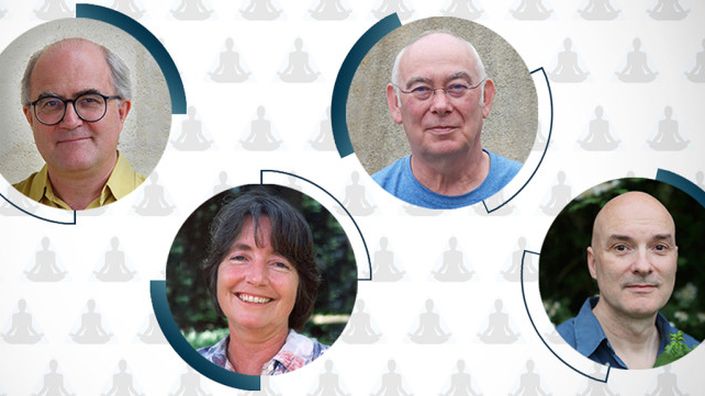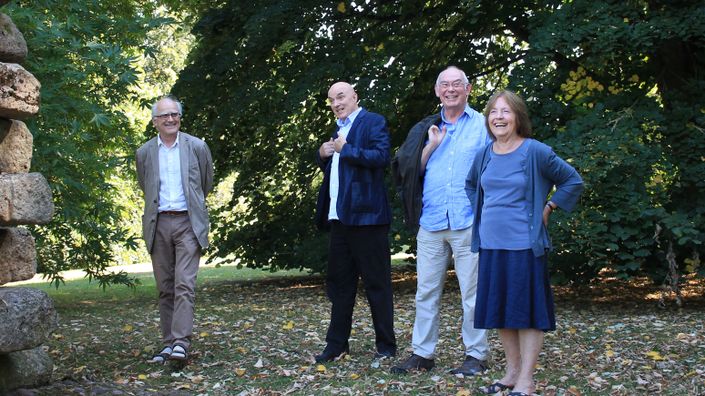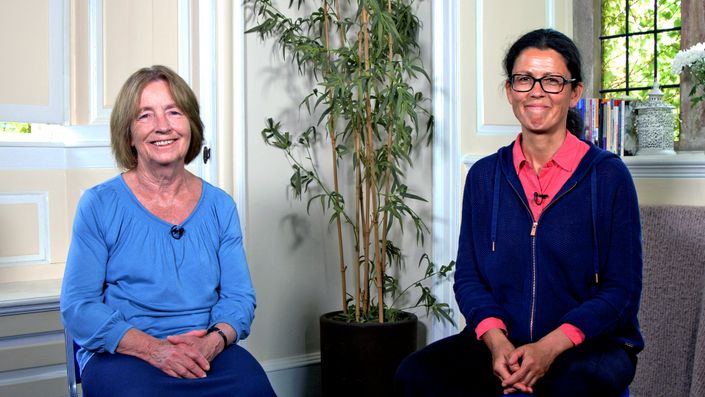Dependent Arising
Study the most profound and freeing teaching of the Buddha with the founders of Bodhi College.
What is dependent arising?
Dependent arising means that everything is conditioned by other factors. A flower needs the conditions of sunlight, soil, and water to grow. Or collectedness of mind may be conditioned by relaxation, as a meditative example. All things arise dependent on conditions. They don't appear out of nowhere. This is common sense but if we follow this teaching all the way the view becomes deeply profound.
Knowledge of dependent arising is the bedrock of Buddhist wisdom. It enables all of the other teachings to have their effect. Traditionally, there are twelve links in the chain of dependent arising. These links describe how mental states arise and evolve, and how we can shift the outcome of this process towards greater happiness and peace.


Study online, start today
This easy-to-use online course is available to all. It comprises six units that form a program of instruction, discussion, meditation, and inquiry. Each unit contains around 60-90 minutes of material to study, as well as contemplative exercises. You are free to study at your own pace, and will retain ongoing access to the material.
Benefits

6 hours of video guidance
From talks to guided meditations, discussions, and inquiry practices, Dependent Arising offers stimulating and illuminating video content in manageable chunks. You'll also be able to download audio files to listen to offline.

Understanding through discussion
A strength of Bodhi College is the plurality of voices within the faculty. We don't always agree, and this helps us find a reasonable way forward based on dialogue and discussion. Each unit contains a discussion with a range of viewpoints.

A fresh look at traditional teachings
Our aim is to look beyond any dogmatic interpretation of dependent arising, and benefit from that which is of real value for our lives in the world today.

Live a contemplative life
Dependent arising is arguably the most effective lens through which you can inquire into life. It offers immense potential for dissolving the habits of mind that cause suffering.

Welcome to the deep end
Dependent arising is profound but not hard to grasp with guidance from experts who know the way. You can go incredibly far with this teaching. It has great explanatory power, subtlety, and depth.

Expert tuition
Learn from the four founding members of Bodhi College, each with decades of practice, study, and teaching to draw on.
Course Curriculum
Meet Your Teachers

Stephen Batchelor
Stephen is a Buddhist teacher and writer known for his secular or agnostic approach to the Dharma. Formerly a Buddhist monk in the Tibetan and Zen traditions, he is the translator and author of several books including Buddhism Without Beliefs, Living With the Devil and After Buddhism. What is this? Ancient questions for modern minds, was published by The Tuwhiri Project in 2019. His most recent book is The Art of Solitude.
Stephen considers Buddhism to be a constantly evolving culture of awakening rather than a religious system based on immutable dogmas and beliefs. In particular, he regards the doctrines of karma and rebirth to be features of ancient Indian civilisation and not intrinsic to what the Buddha taught. Through his writings, translations and teaching, Stephen engages in a critical exploration of Buddhism's role in the modern world, which has earned him both condemnation as a heretic and praise as a reformer.

Christina Feldman
Christina is a co-founder of Gaia House and a guiding teacher emeritus at Insight Meditation Society in Barre, Massachusetts. The author of a number of books, she has been teaching insight meditation retreats internationally since 1976. She is one of the teaching faculty of the CPP program, dedicated to the study and application of the early teachings of the Buddha. She also teaches on the Buddhist psychological foundations of mindfulness to those training to teach mindfulness-based applications in England, Belgium and the Netherlands.
Christina's recent books include Boundless Heart: The Buddha's Path of Kindness, Compassion, Joy, and Equanimity and Mindfulness: Ancient Wisdom Meets Modern Psychology, with William Kuyken.

Akincano Weber
Akincano is a Swiss Buddhist teacher and psychotherapist. A former monk, he has lived and practiced for 20 years in European and Thai Forest monasteries. Particular interests are early Buddhist texts, stillness and contemplative psychology. He is guiding teacher at Atammaya Cologne, in Germany, part of the CPP program, the MBSR-Institute Freiburg and teaches meditation and Buddhist Psychology in secular and traditional contexts in Europe and overseas.

John Peacock
John is an academic and a Buddhist practitioner of fifty years. Trained initially in the Tibetan Gelug tradition in India, he subsequently spent time in Sri Lanka studying Theravada. He lectured in Buddhist Studies at the University of Bristol, was Co-Director of the Oxford Mindfulness Centre and taught on the Master of Studies program in MBCT (Mindfulness-based Cognitive Therapy) at Oxford University. John has been teaching meditation for more than thirty years and is a Gaia House guiding teacher.
Reviews from Students of the Course
This was a profound learning experience. The teachers shared their own return over and over to Dependent Arising, as a mark of this teachings great core importance. This made the course come alive, their process of learning gave me hope that this truly is a teaching I can engage deeply. There was so much support through the teacher's depth of knowledge, and openness. The course was structured with the talks being excellent and focused; the modules unfolded with written summaries of each talk available for review. The greatest gift from this course is feeling I can work with this teaching and begin an ongoing exploration of Dependent Arising; the gentle confidence is there. This is a remarkable gift, deep bows to the teachers. My heart is full of appreciation.
Brilliant and knowledgeable teachers make a complex teaching accessible and relevant to our lives today. I am so grateful to Christina, Akincano, John and Stephen for taking the time and care to share their deep understanding of this valuable and continuously relevant foundational Buddhist teaching.
This is a fantastic course, taught by four deep thinkers of the dharma. The way they explored this profound teaching is priceless. I've learned a great deal and deeply moved to put the teaching into practice.
The course, Dependent Arising, is at the onset overwhelming. Each unit is underpinned with the wisdom of the sutras and the down to earth applications in daily life. I will be returning to this course many times as I work with opening my heart to letting go of habitual tendencies and letting in more ease, peace and freedom. May it be so…
The clarity, warmth, and energy these teachers bring and encourage on this course is so often a joy to experience- and it certainly helped to untangle my trepidations and continuing efforts on the path of living.
This course on a pithy topic with teachers well reversed in the dharma and their respective fields was well worth my investment of time and money. The teachers are clear and engaging, the discussions thought-provoking and the supplemental resources allow easily for continued study.

About Bodhi College
The aim of Bodhi College is to develop fresh ways of understanding the dharma today through rediscovering the core insights of early Buddhist teachings. Courses provide a contemplative education that inspires students to realize the values of the dharma (Buddhist teachings) in the context of this secular age and culture.
In the spirit of the Buddha’s teaching, Bodhi College is committed to a middle way of human awakening that integrates theory with practice, encouraging both personal fulfillment and social engagement.
Related Courses
You may also be interested in these online courses from Bodhi College and Tricycle.




